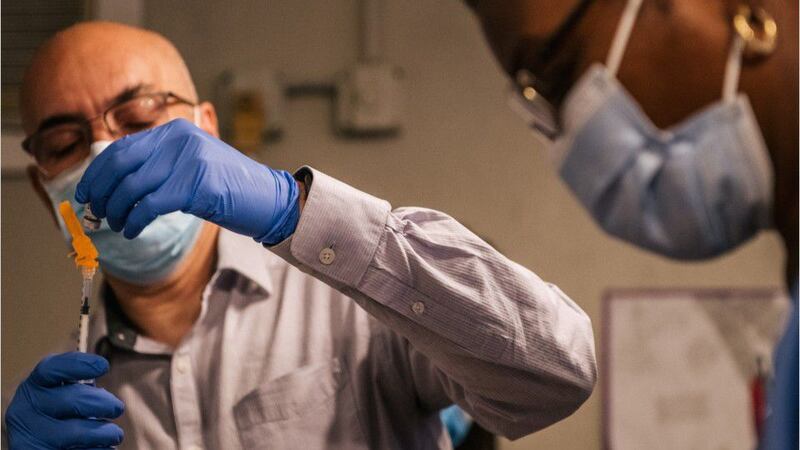The White House on Wednesday called for a third shot of the COVID-19 vaccine for those who are fully vaccinated with either the Pfizer-BioNTech or Moderna mRNA shot.
However, those who received the Johnson & Johnson vaccine were told they have to wait a bit longer for the extra shot.
The new guidance on a booster shot for those who have had Pfizer’s or Moderna’s mRNA vaccine has grown out of the explosion of cases linked to the delta variant of the COVID-19 virus. Another factor in the decision comes from research showing that the effectiveness of those vaccines against the variant is not as high as against the original virus.
Nearly 14 million people have been given the one-dose Johnson & Johnson vaccine that received emergency use authorization from the U.S. Food and Drug Administration in February.
In Wednesday’s announcement those who have received the J&J vaccine were told that booster shots will be coming, but that more research needs to be reviewed before they are administered.
“We also anticipate booster shots will likely be needed for people who received the Johnson & Johnson (J&J) vaccine. Administration of the J&J vaccine did not begin in the U.S. until March 2021, and we expect more data on J&J in the next few weeks.
“With those data in hand, we will keep the public informed with a timely plan for J&J booster shots as well.”
In July, J&J researchers reported that their trials showed the vaccine provides immunity that lasts at least eight months and good protection against hospitalization and death by the delta variant of the virus.
An independent study showed that the J&J vaccine was not as effective against the delta variant. The new study has not yet been peer reviewed nor published in a scientific journal, The New York Times notes.
According to Johnson & Johnson, a booster shot would not be necessary any time soon. However, a spokesperson for the company told CNN that research is ongoing to determine the need for a possible second shot.
“Ensuring long-term and durable protection against hospitalization and death are critical in curbing the Covid-19 pandemic,” the company said in an email to CNN. “Johnson & Johnson continues to diligently generate and evaluate evidence from ongoing trials as well as emerging real-world evidence as it assesses the need for a booster of the Johnson & Johnson Covid-19 vaccine.”
The Johnson & Johnson vaccine is different from Pfizer’s and Moderna’s mRNA shots. Johnson & Johnson’s shot uses a viral vector – a common cold virus – to infect human cells, then delivers genetic directions to the cells and trains them to recognize and fight the COVID-19 infection.
If it is determined that those who received a J&J vaccine need a second dose, it is unclear whether U.S. health officials will suggest that it be a second dose of the J&J vaccine or perhaps that of an mRNA vaccine.
Other countries have combined the AstraZeneca vaccine – which is similar to the J&J vaccine – with an mRNA vaccine.
At this time, the Centers for Disease Control and Prevention does not recommend mixing vaccine types.
However, in San Francisco, Zuckerberg San Francisco General Hospital had made the decision in conjunction with San Francisco’s Department of Public Health to offer an mRNA vaccine to those who have had the single dose of the J&J vaccine.
Before anyone can get a booster shot, the Food and Drug Administration must first authorize a third dose of the vaccines, and a CDC advisory committee must review the evidence and make recommendations.
©2021 Cox Media Group







